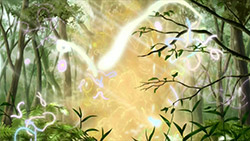 |
 |
 |
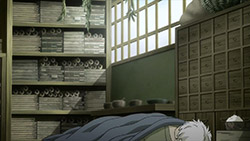 |
 |
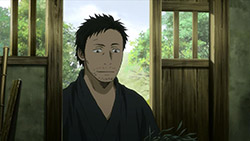 |
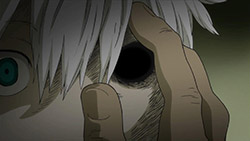 |
 |
 |
 |
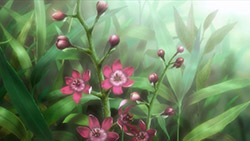 |
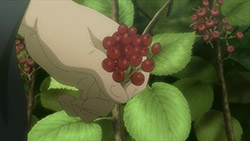 |
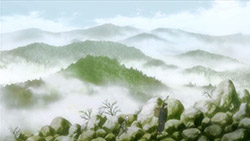 |
 |
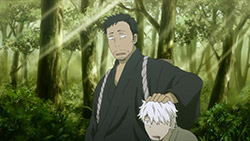 |
 |
 |
 |
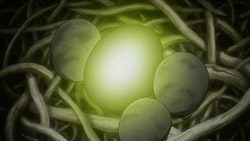 |
 |
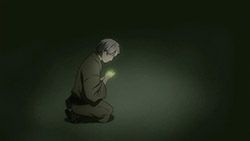 |
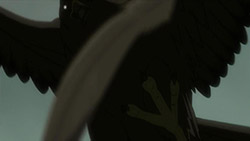 |
 |
 |
 |
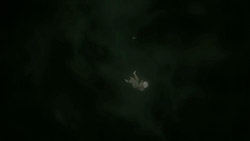 |
 |
 |
 |
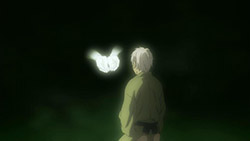 |
 |
 |
 |
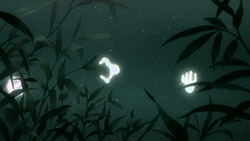 |
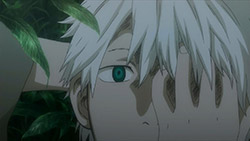 |
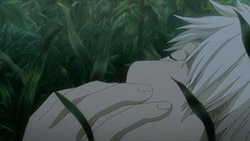 |
「草の茵」 (Kusa no Shitone)
“Pillow of Grass”
It’s a minor source of curiosity for me that while Mushishi uses an English opening song, it’s so intrinsically Japanese. Its setting is a distinctive feudal Japan, and its mythology obviously inspired by Shinto. It’s of a time before humans had tamed the wilds and mastered its secrets, when nature was still profound but at the same time dangerous, inspiring both wonder and suspicion. Riding above all that is an abiding sense of ephemerality—something much more commonly found in works from the East compared to the West—because ultimately Mushishi is about life, and with it life’s shadow, death. That’s heavy stuff, but never too dark, because while death is a poignant subject Mushishi always manages to find more value in living. This new episode of Zoku Shou is no different.
Road of Thorns was perhaps even heavier than usual for Mushishi, so our second half of Zoku Shou pulls back from that to tell a story from the childhood of our protagonist, Ginko (voiced, when as his younger incarnation, by Sawashiro Miyuki). For those of you new to Mushishi this is not the place to start; you will appreciate this series a lot more by starting from the very first season. If you did, then you’d appreciate that this restart of Mushishi Zoku Shou still preserves all the good things you’ve come to expect of it and delivers an episode no less significant than its predecessors. Like them, Pillow of Grass is a self-contained narrative, but at the same time builds the overarching mythology of Mushishi‘s world. Not only do we learn more about the mechanics of the mountain lords and the Veins of Light, but also about the enigmatic mushi-shi as well. Zoku Shou had introduced mushi-shi of all stripes to us, and this episode revealed that some, just like normal people, are just simple scum, trying to use Ginko to establish an easy business model (and, as is common in the Mushishi world, their toying with the mushi backfires). It’s a good thing we have Suguro (Nakao Ryuusei) to serve as a proper father figure for the young Ginko. Kind, yet firm, Suguro teaches Ginko a life lesson. About life.
Ginko’s conflict this episode lies in his juxtaposition with the egg of the mountain lord. Ginko considers it ‘the chosen one’, while he considers himself the unwanted one. It’s an existential crisis, especially when he breaks the egg, with Ginko seriously questioning why he deserves to live. The lesson is one that is a central theme of Mushishi: all creatures strive for life, and thus all life is sacred. Ginko instinctively understands the will to live; the hungry Ginko saw food and did not hesitate to eat. Even the parasite in his eye is just struggling for survival. To think that only those that are ‘accepted’ deserve to live is human hubris. ‘There is no place in this world where we do not belong’. In pre-Industrial Japan, Suguro can confidently say that humans are just a part of nature. It’s a compliment; just look at what it is that we belong to. This is one of those episodes of Mushishi that really emphasises the beauty and majesty of nature, with many deliberate shots of flowers and landscapes (and both). The world of Mushishi is still an expansive frontier, and it, unlike us, accepts all life. Where you lay your head is home. Hence, Pillow of Grass.
One eye to the future
Mushishi is one of those series where I don’t really feel compelled to make predictions on its direction. It has always gone on consistently, one step at a time, content with its own pace. And I am content to just follow it as it goes. More than its plot, Mushishi has always invited its viewers to just soak in its world, its mythology, and its philosophy—in a natural manner, one might say. There is a journey here, made more apparent in Zoku Shou, but the emphasis is on taking in the sights as you go. Of course, I’d love to know more about the Forbidden Mushi, or revisit some of our old friends to see how they’re going. Such is my faith in Mushishi and the quality of its composition, though, that I’m happy just letting it reveal itself to us. I think that’s one of the highest compliments you can give any performance.
Preview
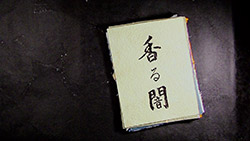 |

Best anime of the year 2014.
And best part, it didn’t take millions (yen) to make, in fact theres minimum amount of detailed movement at all.
Even better, there’s no fanservice.
There is fanservice in the form of making you calm,concentrated and not overexciting your brain with flashing and constantly changeing images. Even if there was nudity in Mushishi it would be handeled in an adult way.
Great back story episode!
On the other hand, I was not able to get over the fact that young Ginko was voiced by Space Bros Serika-chan for the entirety of the episode. I guess it’s one if those things that you can’t stop noticing it one you realize it’s there.
Or every other role Sawashiro Miyuki does
Great episode to start the second half of Zoku Shou. The feels were heavy with this episode. I was really shocked when I saw Ginko dropped the egg and disrupted the natural order, sad that Suguro couldn’t forgive him but quite happy that he still led Ginko to believe that even someone unique as him has a place he belongs to…which is why the mountain lord also led him back out.
I was waiting for an episode like this ever since I finished the Nui arc of the first series. There was always this hole after that arc of how Ginko dealt with what happened to him as a child and how he came to accept things and move on. This episode filled that hole perfectly and gave us a lot of development on Ginko. It also reminded me of the episode with the woman and the rain-forming mushi and how both learned to live together just like Ginko learned to live together with that mushi in his eye.
Solid fantastic episode!
Also there was tons of scenery porn.
I considered Suguro a ‘strict dad’ sort of character. All actions have consequences, and if you’re of a philosophy that values all life then you have to take some actions and consequences more seriously than most.
I thought there would be no coverage of Mushishi Zoku Shou this season due to the absent of Enzo… or is that just for the first ep of the 2nd season or will you cover it from now on Passery?
I’m already covering two other series this season, so I’m not going to fully commit to Mushishi just yet. I will be covering the first few episodes to see how it fits into my schedule. I do love Mushishi, though, so chances are good I won’t be able to resist picking it up full time.
Nonpareil.
Best premiere of the season. It’s very much a beautiful surprise to have been granted the chance to explore Ginko’s past, as another past story of ginko in the first season is one of the series’ most superb narrative outings. Ginko’s conflict was established really well and looking at the guy he’s manifested into in the present timeline of mushishi, it only felt natural for him to feel doubt and dilemma over his existence initially. Suguro is probably one of the most subtle and useful guest characters in Mushishi and he had some of the most quotable lines in the series. Overall i could’t have been satisfied more with this premiere. For me the Fall Season hasn’t kickstarted until now.
I envy mushishi because I don’t like urbanism
It’s episode 13. 11 and 12 were the special; Odoro no Michi.
@LW and @mac65
I referenced several sources before settling on numbering this episode as 11. From what I understand, Road of Thorns is being treated as specials and have been removed from the numbering.
We finally get some excellent, solid background on Ginko and how he got to be Ginko.
I thought it was telling that not every sorrow is forgiveable; a choice was made and
something important was lost. Ginko was not forgiven. Somehow we’ve arrived at a
cultural point where harm done is always expected to be forgiven, and that makes it
okay. Suguro is not the bad guy here.
@Passerby The episode numbering is going to confuse some people (it did me);
should be 13 IMHO. Thank you for covering.
Really wanted to see pre-albino Ginko. Oh well.
Also interesting how anyone can drop something so ergonomic when he’s holding it with both of his palms and that close to his body. You would think the natural instinct would be to hold it even closer to one’s chest when there’s an external threat.
Watch episode 12 of season 1 if you wanna see pre-albino Ginko.
Mushishi is arguably the greatest series adapted from a manga. This series is truly one in a million. I absolutely love this series.
Why was is so difficult to forgive Ginko for dropping the egg? It’s not like it’d take dozens of years for the new lord of the mountain to appear.
It was really really sad when Ginko cried. It’s like he cried for all his lonely years of wandering. It’s only anime but it still makes me wonder how is he able to stay alone for his whole life? And basically, he doesn’t have a future either. I guess the feeling of hopelessness went through the whole episode.
We don’t know for how many years there won’t be Lord of the Mountain and yes it can be dozens or more, you have to understand that the mountains will be dead, and people will have to leave their villages and move somewhere else, because of Ginko.
And actually I feel this was episode filled with hope. The Mountain Lord is gone but The Life itself has given a promise it will be back. Ginko can’t stay anywhere for long and put down the roots but Suguro’s words has given him new way for living, when he can say he’s citizen of the world and he connects with every other human being because wherever we are, we live under the same sky and you can find everywhere grass, which can be your pillow.
Aside from the obvious ramifications, Suguro did tell Ginko to stay put. That would make him pissed off.
But, hey, Ginko’s doing much good for other people now. You can say that his “mistake” is part of Life’s bigger plans.
“Where you lay your head is home. Hence, Pillow of Grass. ”
ohh Thank you , I didn’t know the meaning of the title